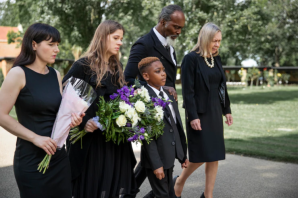Over the course of a lifetime, a great many humans will experience some form of romantic love. From the first flips in the stomach over the cute boy or girl in the classroom to longer-lasting relationships, marriage, and possibly a family, it often seems that our one true goal in our blink-and-you’ll-miss-it existence is to find a deep, meaningful connection with a significant other. Whatever your sex and whatever your sexuality, we sapiens crave love. But what happens when that soulmate dies? How do we possibly cope with what is arguably the greatest grief our hearts can experience?
In her celebrated book On Death and Dying, Swiss-American psychiatrist Elisabeth Kübler-Ross first outlined her five stages of grief theory in 1969. She was inspired to create a work exploring the often taboo subject because of the lack of medical information on the psychological impact of death at the time. While not without its flaws (nor was it the first attempt to create such a work) the Kübler-Ross model is widely regarded as the go-to explanation of how we deal with bereavement and how to understand it better.
In it, she explains that whenever we suffer any kind of grief trauma, we will go through the following five stages:
Denial – The equivalent of numbness. Believing that it hasn’t happened, and everything is going to be just the way it was. A coping mechanism.
Anger – A short temper, flying off the handle and anyone and anything, screaming bloody murder at a tree, a carrot, or the dustpan and brush. An intense stage of asking “why me?”
Bargaining – Looking for ways to have some semblance of control and normalisation over the situation. Whether you’re spiritual, religious or otherwise, you might find yourself talking to a higher power and asking for help.
Depression – A retreat into a closed-off and dark world. Not accepting calls or visitors. Possible extensive use of alcohol, with a poor hygiene routine, and not getting out of bed.
Acceptance – Coming to terms with the loss, seeing the light at the end of the tunnel and moving on. Emotions are not as erratic, existence gets easier, a sense of peace is achieved.

Contrary to popular belief, the five stages don’t always come in this order, and they don’t always follow on And in some cases, they are never complete, or you can be stuck at one stage for many years, if not decades.
While it’s important to understand the five-stage model to help us to come to terms with any kind of grief process, when dealing with the loss of romantic love (or any love for that matter) you need to know this – however you deal with it is the right way.
This is your journey, and you must go on it to see it through in your unique way. Nobody else’s grief is going to be the same. You can have all the studies in the world come up with models and theories and scientific explanations, but the simple fact of the matter is everyone will deal with this differently, over a different time frame, with different emotions, reactions, and effects.
So, the first thing you need to do – is to go easy on yourself. You’re allowed to grieve – so go ahead and do just that. Recognise it. Own it. Let it all out. Cry for days on end. Watch movies you loved together. Listen to meaningful songs. Visit the same places, remember the good times, and wallow in the sadness. Go all-in with several boxes of Kleenex close at hand.

It’s going to be okay.
Don’t be afraid to seek support if you need to. Reach out to loved ones, friends and family. They’ll know and understand the process you’re going through. If you can, talk to someone who has experienced a similar loss – they’ll be full of valuable words of wisdom you should listen to.
And It’ll usually be the same advice they’ll give when you separate from a partner or a relationship breaks down – you need to treat yourself as if you were sick. Eat healthy food, binge watch your favourite shows, buy yourself something nice.
And do your best to stay off the booze, smokes, mind-altering substances or anything else that will send you into a deep, dark spiral of depression.
Sometimes, it’s worth enlisting the help of the professionals, and you should feel comfortable in being able to do so. Contact your healthcare provider – there’s no shame at all in asking for a hand from a well-trained bereavement counsellor.
During these trying times, a person’s faith or spirituality will be very important – no matter what you believe. Even if you think that you will never be reunited with your soul mate, just having shared this earth with them in the most unlikely of circumstances, across the vastness of space and time – was worth it all. Sentiments echoed by Ann Druyan, the Emmy and Peabody award-winning American writer and wife of the late, great astronomer, Carl Sagan:
“We knew we were beneficiaries of chance…that pure chance could be so generous and so kind…I don’t think I’ll ever see Carl again. But I saw him. We saw each other. We found each other in the cosmos, and that was wonderful.”
But that’s interesting, isn’t it? How the death of a loved one can mean different things to different people, depending on our beliefs, our outlook on life itself and where we imagine we go when we die. As a champion of science, one hopes that Carl himself was an avid fan of science fiction and could well have approved of a new work by Kas Smith that explores an alternative view of death, and what happens to the soul when we die. Entitled Soul – Augmented, it’s a thrilling, edge-of-your-seat epic about losing a loved one, and how far you are prepared to go to bring that person back, with no time to mourn or so much as consider the five stages of grief in the face of world-ending events and a seemingly insurmountable challenge.
Mark Twain famously once said that fact is stranger than fiction (or something similar) and experiencing the loss of a romantic relationship first-hand is more hard-hitting than anything you will ever read. But there is hope, a light at the end of the tunnel, and it’s possible that time heals all wounds. Holding fast to your beliefs – whatever they might be – will be a guiding light in moments of darkness. You can have the greatest comfort in that.
And read. Never, ever stop reading.
Click the link if you would like to find out more about Soul – Augmented and get your own copy.